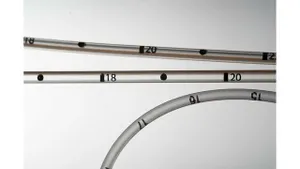Best in Automotive Innovation: Sustainability
SPE’s Automotive Innovation Awards has named four finalists, featured here, in the sustainability category. The winner will be announced during a gala on Nov. 8.
November 7, 2023

The final installment of our series of articles showcasing the finalists for the Society of Plastics Engineers (SPE) 52nd annual Automotive Innovation Awards introduces the nominees in the sustainability category. The winners in all categories will be revealed during the SPE Automotive Innovation Awards gala on Nov. 8.
Basalt fiber-reinforced ADAS bracket
OEM make and model: 2024 Ford Motor Ford F-150
Tier supplier: Yazaki
Processor: HellermannTyton
Material supplier: The Materials Group
Toolmaker: HS Mold Ltd.
Material: Optilon N6-30B HSL BK polyamide (PA) 6+basalt fiber
Process: Injection molding
By replacing E-glass with basalt fiber in this injection molded ADAS bracket, which also contained 60% post-industrial recyclate (PIR) PA 6, cost and weight were neutral, the part met all performance requirements, and no tooling changes were needed. A 74% CO2 reduction was achieved and 180,000 kg of material annually is kept from landfill. The drop-in change is more sustainable, addresses glass-shortage issues, and provides the same performance as virgin material.
Bracket from recycled BMC
OEM make and model: 2023 General Motors Co. Chevrolet Silverado LD
Tier supplier: Valeo Lighting Systems
Processor: Techniplas
Material supplier: LyondellBasell
Toolmaker: Chicago Mold Engineering Co., Inc.
Material: Dura 304 unsaturated polyester bulk molding compound (BMC)
Process: Injection molding
Replacing magnesium with unsaturated polyester BMC yielded structural brackets meeting high dimensional requirements at comparable or improved mechanical performance, especially in terms of toughness. The bracket was made more sustainable with inclusion of 6% PIR acrylic resin (PMMA) and 5% PIR BMC scrap, which replaced calcium carbonate filler. It took two years of work to develop the process to recover and reclaim thermoset BMC scrap and reuse it in new parts with a lower CO2 footprint. Key to the success of the program were grinding, sizing, and formulation strategies. No tooling changes were required to replace the virgin BMC.
One-piece frunk
OEM make and model: 2024 Ford Motor Co. Ford Mustang Mach E
Tier supplier/processor: IAC Group
Material supplier/toolmaker: Advanced Composites Inc./HS Inc.
Material: ADX8327 20% post-consumer recyclate (PCR) thermoplastic polyolefin (TPO)
Process: Injection molding
This is the first time a 20% PCR material has been used in a color-matched, molded-in color (MIC), Class A structural frunk application. Compared with virgin TPO, the more-sustainable grade lowered density slightly and offered better impact at -15°C. Concurrent redesign reduced component count from six to one. The elimination of two metal brackets saved 3 kg of mass, increased cargo volume and functionality, improved water management, reduced cost and labor, and saves an estimated 1,125 tonnes of CO2 annually. PCR content is sourced from yogurt cups and packaging materials.
Eco-friendly cable control
OEM make and model: 2024 Ford Motor Ford Mustang
Tier supplier: Aptiv
Processor: HellermannTyton
Material supplier: Ascend Performance Materials
Material: Redefyne IAI2H BK0858 polyamide (PA) 66
Process: Injection molding
This is the first broad-scale shift from virgin to post-industrial recyclate (PIR) PA 66 in cable management parts, a drop-in-change offering comparable performance, aesthetics, and processing at lower cost and a 35% lower carbon footprint without any part design or tooling changes. Although the parts are small, they are produced in high-cavitation injection tooling and offer best-in-class mechanical, thermal, and chemical performance. In just the first year, the change reduced CO2 emissions by 138,000 kg and saved 70,000 kg of coal.
About the Author(s)
You May Also Like




